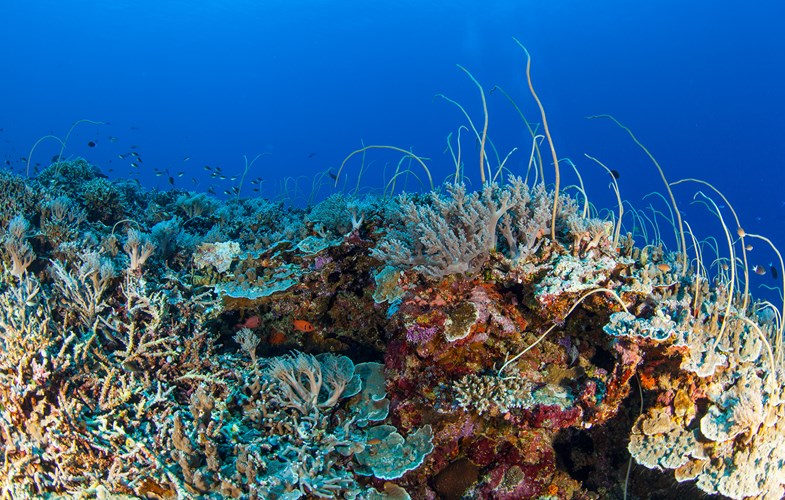

As part of the world's largest environmental network, we are committed to protecting sharks and their habitat.
IUCN - International Union for Conservation of Nature
The world is heading for unprecedented levels of species extinction. The numbers are frightening. In the next few decades, we could lose
- more than 30% of all coral reefs,
- more than 1/3 of all marine mammals.
- more than 30% of all sharks and rays.
The main cause for the dramatic situation is the industrial fishing of the last 50 years. For us as a species conservation organization specializing in sharks, it was therefore only logical that we become a member of the "International Union for Conservation of Nature", or IUCN for short.
Founded in 1948, it is now considered the world's authority when it comes to recording the state of nature and developing measures for its protection.
The nature conservation association has more than 1400 members and over 18,000 experts from all over the world work for it. It is probably the largest collection of expert knowledge in the fields of environmental protection and species conservation.
One of the best-known IUCN instruments is certainly the IUCN Red List of Threatened Species TM, the world's most comprehensive overview of the conservation status of plant and animal species. It lists the known species and assesses their risk of extinction based on various criteria. It ranges from "Least Concern", i.e. not endangered, to "Endangered", i.e. highly endangered, to "Extinct". A closer look at the list also reveals the appalling situation of shark and ray species:
- As of 2021, 36 % of all shark and ray species are considered endangered.
- In the case of deep-sea sharks, this figure is as high as ¾ of all species.
Due to its solid scientific basis, the IUCN Red List is considered the guideline for the state of biodiversity and the resulting necessary measures.
In addition to the IUCN Red List, the IUCN has many other tools at its disposal. For example, the IUCN Red List of Ecosystems or Protected Planet, the world database for protected areas.
The association always works very democratically and has therefore set up various steering bodies.
- The IUCN Secretariat, which has the mandate to translate the vision of the members into action.
- The IUCN Council, the main governing body, whose members are elected by the members.
- The IUCN Congress, the World Conservation Congress, which is convened every 4 years.
For the members, the latter is always of the utmost importance, as it sets the global conservation agenda by voting on recommendations and guiding the work of the Secretariat through the adoption of resolutions and the IUCN Programme.
For us, too, this date is always of great importance, as it is here that we can advocate for what we see as necessary measures to protect the ocean, the species that live in it and thus, of course, the sharks.
Goal
Within the framework of the IUCN, we mainly advocate for the following issues:
- Conservation measures for the preservation of shark and ray species. The most recent example is the shortfin mako in the Atlantic.
- By 2030, 30% of the ocean surface is to be protected. Our goal here is to designate these zones as "No Take Zones" or at least "Highly Protected Areas", i.e. areas in which no or hardly any fishing is allowed.
- Ecosystem-based fisheries management, such as banning harmful fishing methods, reducing bycatch or the "Fins Naturally Attached" regulation.
- Moratorium on the deep sea, which is severely threatened by deep-sea mining, among other things
- Curbing the climate crisis and the associated loss of coral reefs. At 2 °C warming, 99 % of all corals will die.
Involved partners
We work globally with a wide range of organizations.
Location
Work within IUCN takes place all over the world. We work with organizations around the world and attend congresses where possible, such as Marseille in 2021.
Downloads
2021 - Position paper on improving industrial fishing and the fishing method used (German and English)
Links
IUCN Rote Liste Allgemein: https://www.iucnredlist.org/
IUCN Rote Liste Haie und Rochen: https://www.iucnredlist.org/search
IUCN Kongress 2021 Höhepunkte: https://www.iucncongress2020.org/newsroom/daily-highlights
2017
Sharkproject becomes full member of IUCN
2020
IUCN Congress has to be postponed to 2021 due to the COVID-19 crisis. This is a considerable loss, especially in view of the dramatic situation in the field of climate and species protection.
2021
Participation in the IUCN Congress in Marseille, including a press conference on our position paper "Improving industrial fishing and the fishing method used". One thing became clear at the Congress. We still have a chance, but we all have to act now

